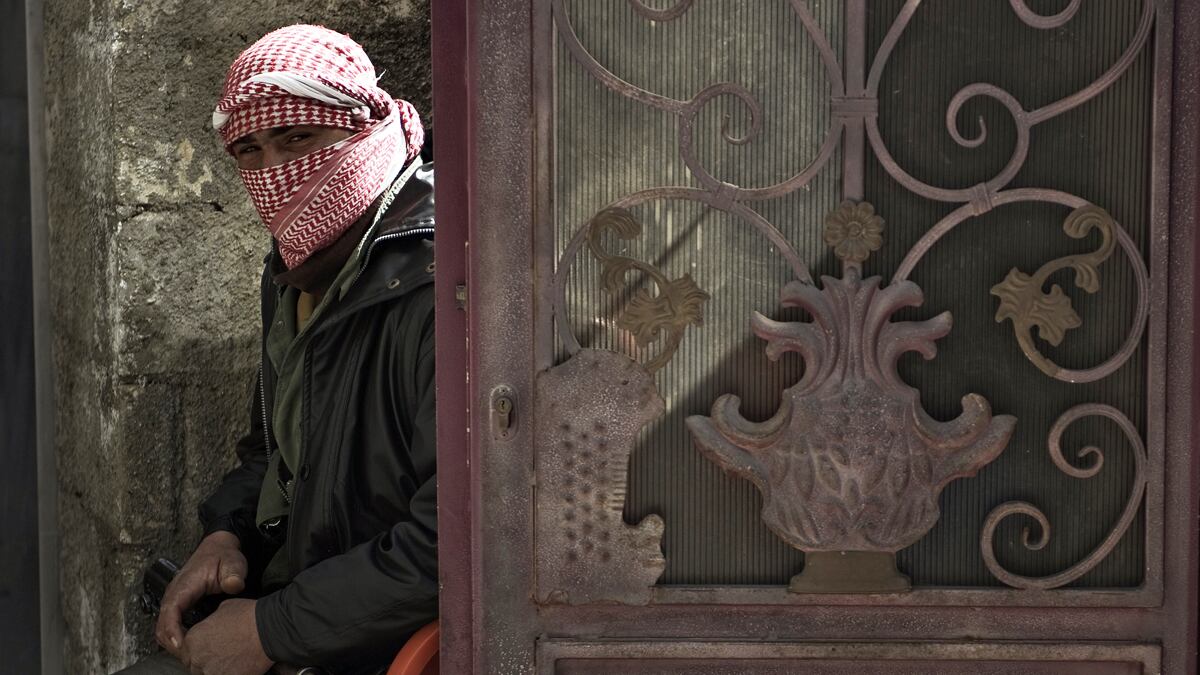The first armed rebels emerge shortly after crossing the borderline. Near the western Syria city of Qusayr, in a small house in the middle of an idyllic sunny orchard, the young men lounge on mattresses while drinking green mate tea. On the wall the group's weapons are hung up on a long, improvised hanger instead of jackets: variants of Kalashnikovs, pistols, an antiquated rifle, an equally mossy rocket launcher and a few modern, American-made M16 assault rifles.

The boys are from the nearest village and have bought their weapons themselves. A Kalas costs about $2,000, usually bought from the same Syrian government soldiers they fight against. An M16 is somewhat more expensive, around $3,500, but available in abundance on the other side of the border in Lebanon.
The young people maintain that they are not an offensive army. "None of us have fought before, but our friends and families were arrested and killed, and so we bought the weapon and began to fight. Mostly protection, sometimes attacking, if we can see a weak point in Assad's army. But we can fight less than an hour, we are not strong enough,” one of them acknowledges. They claim that the fight is not sectarian in nature, and claim friendship with local Christians as evidence, showing off a grenade-grazed church as evidence of their mutual interest in getting rid of the Assad-government.
The trip toward the rebel-controlled city of Qusayr is fast and feverish. Walkie-talkies chatter with information about enemy movements. The route zigzags up between regular roads and field paths to avoid Bashar al-Assad’s Army, which effectively controls the countryside. In one instance, the rebels sprint across a road just a few hundred meters away from a checkpoint manned by Assad’s troops.
It is obvious that the Syrian rebels in the Free Syrian Army can’t match Assad's army militarily. Other facts about the rebels are less clear. Are they idealistic freedom fighters with humanistic principles? Or are they religious fundamentalists with the veiled goal of trampling other religious groups underfoot? Or something else entirely? The questions are crucial, because determining the true colors of the Free Syrian Army will then determine whether a hesitating world will ultimately intervene in favor of Assad's opponents.
Complicating matters is the patchwork nature of the rebel army, which ranges from young local boys to businessmen and engineers to the occasional jihadist and the professional soldiers who defected from Assad's Army.
One of these is Bakr Mustafa or Abu Saleh. Formerly an officer in Assad's Army, he deserted seven months ago and now commands some 120 soldiers in the al-Faroukh brigade.
"I wanted to join the rebels earlier and talked to friends I knew were in opposition. But they told me that I would be more useful staying. So instead I smuggled weapons out and passed on details until I was finally away on a leave of absence and joined the Free Syrian Army," the soldier explains.
The Free Syrian Army’s relationship with the government army is ambiguous. Bakr Mustafa says that the few heavy weapons the rebel army possesses have been purchased from soldiers in the government army. While news reports state that arms dealers are waiting to ship in heavy arms to the rebels, they obviously haven´t arrived yet.
Many of the rebels are defectors from the Army, which forbids its recruits to talk with the locals and often rotates companies in order to prevent desertion.
Bakr Mustafa talks about how captured soldiers are persuaded to switch sides. "We jail them and interview them, take the names of their officers and other important information. We try to find out where they are mentally and if they are ready to join us,” he explains. “Otherwise, we let them go."
This is another controversial issue concerning the rebel army. Recently international turmoil arose when the German magazine Der Spiegel published an interview with a wounded soldier in Lebanon who claimed to be an executioner for the rebel army, killing captured soldiers caught in atrocities.
The magazine was accused of forgery, and the article was denied by the leader of al-Faroukh brigade, to which Bakr Mustafa belongs. But the local officer confirms that executions do take place systematically.
"If we know and can prove that the captured soldier is a killer, we kill him,” he confirms. “There are many steps in the process. We gather evidence. Often, they documented their abuse, rape, murder, torture. We have many SIM cards with recordings, and we get new ones every day. The captured soldiers are interrogated by people who specialize in it, and if we find out that they are guilty, they will be killed with a bullet here," he says, and presses his finger to his temple. "Then we take a picture. Their families are also entitled to know what happened to their relatives, when this is all over," he said.
While improvised courts performing executions are not new in civil wars, it is exactly the sort of thing that can turn public opinion against the rebels.
But it is a point upon which even lawyers supporting the rebels do not agree. "I have started a process of gathering evidence of human-rights violations,” says one exiled Syrian lawyer. “There is evidence for hundreds of lawsuits, which we will surrender to the International Criminal Court, and which we gather in cooperation with Human Rights Watch. The murderers must be judged by real courts, there are no summary executions in Syria of the government’s people. This is important to us," the lawyer emphasizes.
But another exiled lawyer has a different version: "There will not be a bloodbath, but it is evident that the people who have blood on their hands must die. Shabiha-people must die," he says, referring to the paramilitary units that are behind many of the worst atrocities.
Previous cases of torture and extrajudicial killings by the rebels have been documented with testimony and reports by Human Rights Watch, which finds the practice deeply problematic, according to a representative of the rights organization.
"These kind of executions can in no way be described as fair trials,” says Nadim Houry, Human Rights Watch’s Syria officer, who is gathering evidence of abuses by both sides for use in future trials. “Not with confessions that may have come under torture, and the judge and prosecutor integrated into the same institution. They would not pass in a country with rule of law, and there is a need to remind the opposition that the Syrian revolution started out being about personal rights and that these rights should apply to everyone—including prisoners of war. "
In Syria nobody really denies that death sentences are being handed out. In the makeshift headquarters for the Qusayr region's commander, Abu Arab, one of his men gives a tour of the blooming spring landscape, where red poppies spread out in the green grass, and white apple blossoms are everywhere on the trees, while grenades detonate in the distance. The rebel soldier shows how hostile grenades and rockets have ripped apart the apple trees and created craters in the fertile soil, before he brings me back to staff headquarters, a blanket spread out under a tarp with a gas burner and Arabic coffee bubbling on it.
"This is not an army of Salafi-islamists or al Qaeda. There is no problem with Christians, nor even with people of Assad’s alawit-sect, "says an officer. "We will not even kill Shabiha-militia-folk if they declare themselves against Assad. But if they are responsible for atrocities, and if they are still with Assad, we will kill them, "says one of the soldiers and make the same motion with a finger against his temple. “Always," he stresses.






